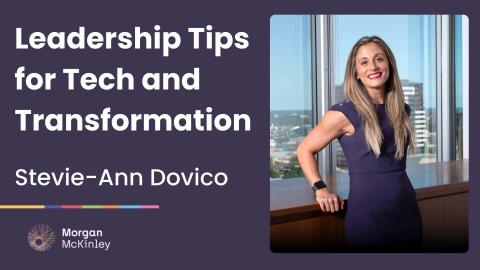Jennifer Leech, UTS: Leadership Tips for Tech

We spoke with Jennifer Leech, Integration Manager at UTS, a dedicated professional who aims to break down barriers for women in technology. In our interview, Leech discussed how to build a successful tech career and inspire the next generation of female tech leaders, among other topics.
Two Decades of Excellence in IT Integration and Personal Passions
Jennifer has 20 years of experience in IT, predominantly in Integration. She started her career as a Developer and gradually moved up the ladder in the Integration space. In the past decade, she has worked as a Chief Architect in a Consulting environment to deliver design, architecture, and governance consistently across clients.
She is passionate about health and nutrition and loves to travel.
What factors do you think have been critical to the success you have achieved in your career?
It is good to have a goal to be successful. When I was younger, I saw people say no to things because they didn't fit in with their strict career goals, and they missed out on opportunities. I always knew I wanted to be in integration, and I was given a variety of opportunities. I just kept saying yes, and eventually, I found a path that worked really well for me.
I believe that being interested in what's going on around you, not just what you're doing, looking at what the business and other teams are doing, being aware of what the different organisations are focussing on, listening to podcasts, and listening to people who have previously done what you are interested in have been factors that have helped me progress in my career.
It is essential not to be a know-it-all but to be more of a sponge, a person who wants to learn, ask questions, and be curious. You never get to a point where you know everything. Focus on getting where you want, whether it is finding the people around you who know more about a particular topic and spending time with them or, like I said, being a sponge, getting that information over to you in a relevant way.
Sometimes, in your roles, some tasks are enjoyable and some that are not. If you do something that excites you, you will do an excellent job. I’ve learned that we are not all wired the same way, a task that I may not like, another person may really enjoy. As a leader, what has been critical to building a successful team is also putting together a team around me that loves the tasks they do as that makes a big difference to the energy of the team and their teamwork.
In my team at UTS, we have rearranged the team and given everyone tasks and responsibilities that align with their interests and the technologies they are passionate about, and it has been significant to the success of our team.
What's the most valuable piece of advice you've received in your career and how did it help you?
This was a hard one, especially because there is a 20-plus-year-long career to think back on and mentoring was not really something that was around early on in my career. I am unsure if it was around when I started working, but I was never exposed to it.
I have never really had someone take me under their wing and advise me on what, when, or how to do things. What really worked for me was, and I do not recommend it this way, but I worked in a team that was quite critical of my work. They really made me focus on building quality into my deliverables. I quickly learned what quality code and designs looked like!
Not making assumptions is probably one of the biggest lessons I have learned throughout my career. It has been important and helped me, especially when a requirement is missing or poorly defined, and if you make an assumption, it can go horribly wrong.
I have had helpful managers who have encouraged me to be active, have a voice, say what I need to say, be engaged, not to sit in meetings and just listen but to contribute. This is what I encourage my team to do as well. I remind them that what they have to say is essential, they have a lot of valuable information that they can contribute to in our team meetings. The information that they assume that everybody knows is actually exciting and people usually only know 50% of that, so it ends up being beneficial for everyone.
As a leader, you are always going to be asked to do something new and scary. But as you start to understand the process and the role, you get better at it. I always encourage people not to say no just because they have never done it before. You will figure it out, or you can always ask people for help. When you upskill, it is uncomfortable. Learning anything new is difficult, but it is the only way to grow in your role.
What's the most challenging situation you've faced in your career? And how did you overcome it?
I remember a workplace bullying situation that was very stressful for me. Some colleagues were unfairly critical of my work and pretty much made my workday miserable. I was young at the time and probably didn’t respond in the best way I could. Retaliation doesn’t fix anything—life lesson!
It was a difficult situation because I was just learning the ways of the corporate world, and I knew I needed to be professional. Instead of going the formal HR route, I emailed them about their behaviour and how it impacted me. I then slowly attempted to connect with them and extend an olive branch, as I didn’t want my workday to be miserable. It took a while, but we did get back on track.
After reflecting on that situation and being out of that environment for a while, I now focus on building good relationships with my colleagues. I spend time investing in work relationships, realising that we are all different and finding ways to work with different personality types. I’ve found those personality questionnaires helpful in the past to gain insight into how others in my team think or process information and like to work on their tasks.
I don’t regret that experience, as it has made me a better person and leader.
If you were starting your career now, what would you do differently?
I have always been very focused on my career, determined to do something I love and find interesting. I just felt that I wanted to work in technology, and I was always aligned with that.
I would not change anything through my journey. I was at crossroads multiple times in my career, but I always chose IT as I was confident about what I wanted to do.
Right after university, I struggled to get work because I did not have any corporate experience. I ended up with two jobs at the same time. One of them was an administrative role, which was quite convenient and well-paid, and the other was in IT. It would have been very easy for me to have said yes to the administrative role, but it would have taken me away from my hopes and dreams, so I took that IT job. And I am very glad I did.
The second challenge was after I had my first child. I could not return to my old role because it involved too much travelling, so I had to apply for a new role. Again, I had two opportunities come through; one was to help a startup build their e-learning platform, which had the option to work from home, and the other one was for an established Integration product vendor, which included a long commute to the office. It was a hard decision with an eight-month-old baby, but I chose the integration vendor role. I felt guilty every day dropping my baby off at the daycare, but that was a key role in my career that helped me migrate to Australia.
I am happy with every decision that I made because it always put me on the right path.
Why did you choose to work in the technology space? What would you say to other females considering a career in Technology?
To be honest, I believe you just ‘are’ or ‘are not’ built for IT; you will know it if you love IT. You cannot force yourself to be technology-minded. I have one daughter who would do anything but be in IT, and another who is obsessed with coding. And it is just wonderful how coding makes her smile and light up, so I believe you should do what makes you happy.
Many people are unaware that technology can be very creative, and it was one of the things I fell in love with while pursuing my degree. You are faced with really interesting business challenges and ideas. My job revolves around making something work or choosing the best technologies to build the solution. I have to go away and think about this and design or architect something that will fix their problem or implement their idea, and then you see it come to life; it is so rewarding! That is why I fell in love with coding, software engineering, and the architecture side of IT as you can make a significant impact on the way a company operates.
Sometimes, making something work could mean months of looking at a particular piece of code and asking other developers and architects how they have done it, taking others’ inputs, listening to many podcasts, and trawling the internet for examples. It is incredible to see it come together when it finally works.
My advice is to find a career that challenges you and gives you a sense of achievement. Be diligent, don’t give up when the tough times come, push through, and you will look back on a career that you never thought you’d be able to achieve.














